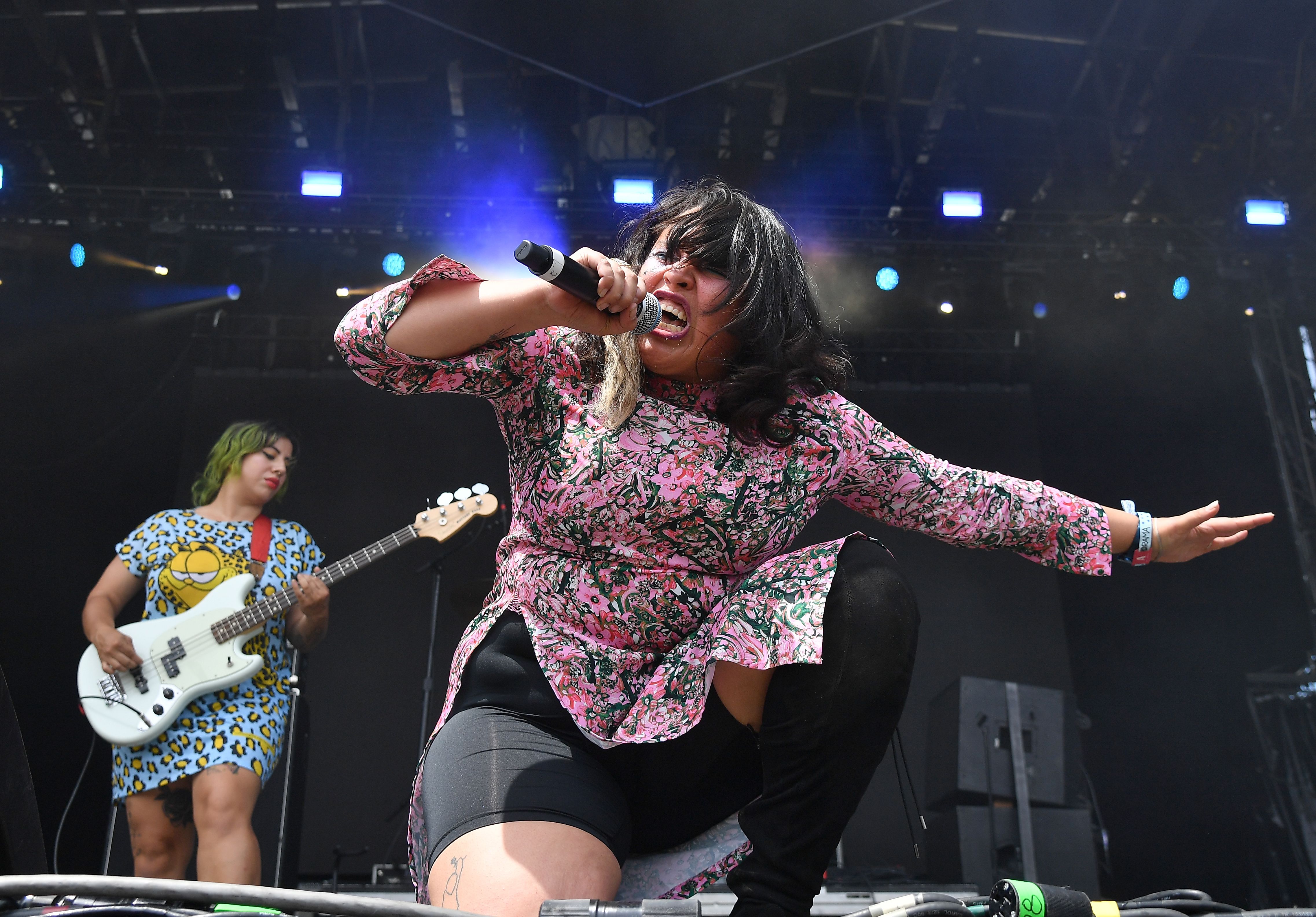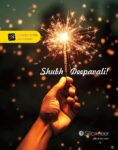Bilingual and woman-led, Downtown Boys bring fresh relevance to punk
Victoria Ruiz of Downtown Boys performs during the Panorama Music Festival on Randall’s Island on July 29, 2018 in New York. (ANGELA WEISS)
New York (AFP) – Attacking male entitlement and economic disenfranchisement with a shouted mix of English and Spanish and intense bursts of saxophone, Downtown Boys are rejuvenating punk rock for a new era.
Formed when frontwoman Victoria Ruiz and guitarist Joey La Neve DeFrancesco worked at a hotel in Providence, Rhode Island, and organized employees into a union, Downtown Boys proudly wear their working-class identity as they take their message everywhere from DIY clubs to major festivals.
While punk rock, despite its long association with politics, became closely identified with white male culture, Downtown Boys are bilingual and mixed gender, with lyrics that take on the fraught issues of race, class and sexuality in the contemporary United States.
Performing at Panorama, the New York weekend put on by the promoters behind California’s Coachella mega-festival, Ruiz led the crowd in chanting a profanity against ICE, the US Immigration and Customs Enforcement agency, which has sparked outrage over its aggressive removal of undocumented people.
Despite a small and largely uninitiated crowd during the early set-time assigned by the festival, Ruiz plunged from the stage to run about and invite unsuspecting bystanders to yell into the microphone alongside her.
Downtown Boys attack the mindset behind border divisions on “A Wall” and the generational lock on wealth in “100% Inheritance Tax.”
Yet the group also reaches into less didactic, more uncomfortable terrain, addressing gender and ethnic double-standards on songs such as “Somos Chulas (No Somos Pendejas)” — which means “We’re Elegant (We’re Not Stupid)” — and taking aim at the attitudes behind gentrification on “It Can’t Wait.”
“Get out of my city / Don’t you have somewhere to be? / You’re worried I’ll treat you like you treat me,” the song goes.
– Musicians as workers –
Ruiz said Downtown Boys saw themselves as part of the larger labor movement, even as artists.
“I think that the internet can really be a race to the bottom for a lot of musicians right now because you are constantly trying to create content, constantly trying to get that next hit,” she told AFP.
“But it can be hard to go outside of your band and really work with other workers. So I think the more we think about everything that happens behind the stage, we will hopefully be able to build more power,” she said.
If the views seem tailored to rally behind the growing US movement of self-described socialists battling President Donald Trump, the band predates the real estate mogul’s rise. Downtown Boys released their debut album, “Full Communism,” in 2015.
The band members still hold day jobs but have seen rising success, recently completing a tour of Europe.
Downtown Boys have signed on to Sub Pop, the influential Seattle indie label best known for Nirvana, and their latest album, “Cost of Living,” was produced by Guy Picciotto of DC-based hardcore favorites Fugazi.
Downtown Boys have tried to live up to their principles, fighting at last year’s South by Southwest to remove a clause that threatened to collaborate with immigration authorities over artists’ visas and giving to gay rights groups to counter the donations of the conservative mogul who co-owns Coachella.
At Panorama, the band was quick to meet the back-stage workers and make sure they were unionized.
– Sax power –
Unlike the infamous three-chord songs of early punk, Downtown Boys bring melodious guitar shifts over the heavy bass. And most notably, the lyrics are answered by ferocious responses on saxophone.
“It feels like a natural extension of a voice that can just express tensions that you can’t do with just words,” saxophonist Joe DeGeorge said.
“When I’m playing, I feel like I’m imagining a better world and the dissonances from the saxophone are the clash with reality,” he said.
DeGeorge, clad in a sleeveless shirt, periodically leaps to center-stage as if convulsed by his saxophone.
If the influence of Bruce Springsteen is not already obvious with the sax, the group covers “Dancing in the Dark,” bringing a fresh, noisier joy to The Boss’s hit.
Other covers by Downtown Boys include “Poder Elegir” (“Power to Choose”), a song about making right personal decisions by Los Prisioneros, the Chilean band that was a thorn in the side of dictator Augusto Pinochet.
DeFrancesco called Los Prisioneros one of the biggest influences on Downtown Boys and wished the Chilean group had a wider audience outside Latin America.
“The lyrics to the songs still have a lot of contemporary relevance to our situation, in terms of just keeping on doing it and fighting,” he said.
Disclaimer: This story has not been edited by Siliconeer and is published from a syndicated feed. Siliconeer does not assume any liability for the above story. Validity of the above story is for 7 Days from original date of publishing. Content copyright AFP.


